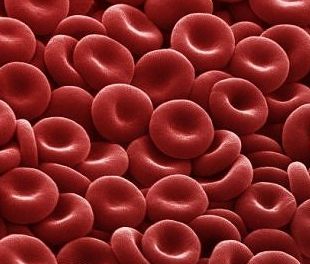

MedFriendly®


Mean Corpuscular Volume (Low & High MCV)
MEAN CORPUSCULAR VOLUME
Mean corpuscular volume (abbreviated as MCV) is the
average amount of space occupied by each red blood
HOW IS THE MEAN CORPUSCULAR VOLUME
CALCULATED?
The MCV is calculated by dividing the total number of
packed red blood cells (also known as hematocrit) by
the total number of red blood cells. The resulting
number is then multiplied by 10. The red blood cells
get packed together when they are spun around at
high speeds in a device called a centrifuge.
The amount of space occupied
by the average of the red blood
cells is the MCV.
FEATURED BOOK: Mosby's Diagnostic and Laboratory Test Reference
WHAT IS THE NORMAL LEVEL OF THE MEAN CORPUSCULAR VOLUME?
The normal MCV level for people over age 18 is between 78 and 98 cubic
micrometers (abbreviated um3). See the next section for a description of cubic
micrometers. The normal MCV level for newborns is between 95 and 121 um3.
Between 6 months to 2 years, the average range is 70 to 86 um3. For boys ages 12
to 18 years, the average range is 78 to 98 um3. For girls ages 12 to 18 years, the
average range is 78 to 102. It is important to keep in mind that the ranges mentioned
above will be different depending on the machine used to do the blood test. Always
use the normal range printed on the lab report to decide what range is normal.
WHAT IS A CUBIC MICROMETER?
A cubic micrometer (abbreviated um3) is an extremely small unit of
measurement that cannot be seen with the naked eye. One cubic
micrometer is equal to one femtoliter. A femtoliter is equal to
.000000000000001 liters. In other words, there are
1,000,000,000,000,000 femtoliters in a liter! A liter is a
measurement of the amount of space that a liquid takes up in a
container, which is equal to 1.056688 quarts. To understand this
better, picture a gallon of milk. It takes 4 quarts of milk to make up
one gallon of milk. Since one liter is a little bit more than one quart, 4
liters of milk is a little bit more than one gallon of milk.
WHAT CAN CAUSE THE MEAN CORPUSCULAR VOLUME TO BE TOO HIGH?
There are many possible reasons why the MCV level can be too high. One reason is because of liver
disease. The liver is the largest organ in the body and is responsible for filtering (removing) harmful
chemical substances, producing important chemicals for the body, and other important functions.
Cirrhosis (a type of disease that destroys the liver) can cause high MCV levels. Another cause of a high
MCV level is alcohol abuse.
Hypothyroidism can cause the MCV level to be too high. Hypothyroidism is a condition in which the
thyroid gland is underactive. The thyroid gland is a butterfly-shaped organ located in front of the neck
that produces a natural chemical known as hormones that affect virtually every cell in the body and many
functions such as disease fighting, heart rate, energy level, and skin condition. Myxedema, the most
severe form of hypothyroidism, can cause high MCV levels as well.
Another condition that can cause an increased MCV level is myelofibrosis, in which the normal bone
marrow (a type of tissue inside of the bones) is replaced by fibrous tissue (the connective tissue of the
body). Yet another condition that can cause an increased MCV level is marrow aplasia, in which bone
marrow is not present in the opening inside of bones where it is normally found.
Reticulocytosis can cause an increased MCV level as well. Reticulocytosis is a condition in which there
is an increase in the number of reticulocytes (a type of red blood cell) in the blood. A cell is the smallest,
most basic unit of life, that is capable of existing by itself. Red blood cells help carry oxygen in the blood.
Having too little vitamin B12 or folic acid (a type of vitamin) in the body can also cause the MCV level to
increase. A vitamin is one of a group of substances made up partly of carbon (an element) that are
essential in small amounts for normal bodily functioning and chemical processes in the body to take
place.
WHAT CAN CAUSE THE MEAN CORPUSCULAR VOLUME TO BE TOO LOW?
There are many possible reasons why the MCV level can be too low. One reason is because of lead
poisoning. Long-lasting kidney failure can also cause the MCV level to be too low. The kidneys are two
organs located on each side of the spine, behind the stomach. The kidneys filter (remove) wastes from
the blood.
A long-term decrease of iron in the body can cause low MCV levels. Amemia can also cause a low MCV
level. Anemia is a condition in which there is an abnormally low amount of hemoglobin in the blood.
Hemoglobin is substance present in red blood cells that help carry oxygen to cells in the body.
Hemoglobinopathy, which is a group of disorders characterized by changes in the structure of
hemoglobin, can also cause a low MCV level.
WHY IS IT CALLED MEAN CORPUSCULAR VOLUME?
Another word for the average of something is the mean. The word "mean" comes from the Middle English
word "mene" meaning "in the middle." Corpuscular comes from the Latin word "corpusculum" meaning
"little body." In this case, the red blood cells are the little bodies. Volume refers to the amount of space
occupied by something. Volume comes from the Latin word "volumen" meaning "something rolled up." In
sum, now you can see why the mean corpuscular volume means the average amount of space occupied
by each red blood cell.















